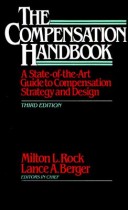McGraw-Hill Training
1 total work
The Compensation Handbook: A State-of-the-Art Guide to Compensation Strategy and Design
by Milton Rock and Lance Berger
Published 31 December 1990
The day of the automatic merit pay rise and cost-of-living increase is over. Today's focus is on performance-based approaches to compensation and benefits that will effectively support the present and future requirements of the corporation. This updated edition of "The Handbook of Wage and Salary Administration" addresses this vital shift in compensation philosophy that has occurred since the last edition was published in 1984. Compensation experts provide advanced thinking on job analysis and documentation, job evaluation technologies, compensation surveys, contingency-based compensation plans, current executive compensation practices, productivity measurement, and the use of computers in compensation. "The Compensation Handbook" is a desktop reference for making informed practical decisions on new policies and procedures affecting today's compensation issues. The work spotlights the strategic and tactical aspects of compensation planning in an era of corporate raids and restructuring, and describes a broad range of contingency-based approaches to compensation, benefits, and job evaluation.
It explains how to select, install, and maintain computer-assisted job evaluation, salary administrative, and executive compensation technologies to support administrative expectations, strategic organizational goals, and human resources philosophies. It also demonstrates how to gauge an organization's "cultural readiness" for a particular compensation approach by comparing the way different organizations and employee groups respond to various reward programs.
It explains how to select, install, and maintain computer-assisted job evaluation, salary administrative, and executive compensation technologies to support administrative expectations, strategic organizational goals, and human resources philosophies. It also demonstrates how to gauge an organization's "cultural readiness" for a particular compensation approach by comparing the way different organizations and employee groups respond to various reward programs.
